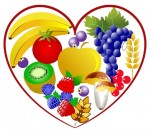We all want to eat the healthiest food possible, and provide safe and nutritious food for our families. But it can be challenging to balance a tight budget with the need for quality food. Many people believe that relatively affordable, conventionally grown food is a better choice than more expensive organic foods. But health advocates claim that organic food is healthier for our bodies and the planet.
1. Pesticides and Sludge
Organic food is more than a catchy name. For a food to be certified organic in most countries, it must be grown under certain conditions. This includes avoiding chemical pesticides, many of which leave potentially harmful residue in conventional produce.
Conventional food is sometimes grown with sewage sludge, chemical fertilizers, irradiation, growth hormones, and other materials and practices that you would probably not want in your food if you knew about them. And while organic fertilizers are not necessarily more pleasant (such as chicken droppings and worm casings), they are still less dangerous than what is permitted in conventional agriculture.
2. Genetic Modification
Organically grown food cannot include any genetically modified organisms (GMOs). No long term studies have yet been done on the health affects of eating GMO foods. Until such studies are conducted by objective third-party agencies, it is wise to avoid these new food products. There is some speculation in the agricultural community that genetically modified foods may cause severe damage to the digestive and reproductive systems, based on their ability to create insecticide factories within plants.
Some countries have banned GMO foods, but in others they are not yet even labeled. The only way to completely avoid GMOs at this time is to either grow your own food from heirloom seed or purchase only organically grown foods.
3. The Labeling Logistics
Unfortunately, organic food is not always what it is cracked up to be. It is important to check labels carefully, and understand there is a difference between 100 percent organic and made with organic ingredients. And small farms may not be able to afford to go through the organic certification process.
When in doubt, ask questions of the farmer or grocer. Useful questions include How was the soil treated on your farm? Do you use chemical pesticides or amendments? and How diverse is the farm?
4. Nutrition Content
The jury is still out on whether organic food is more nutritious. There are many factors at play when determining the nutrient content of food, including freshness, the mineral content of the soil in which it was grown, and the refining process. Organic crackers or cookies are not healthier than conventional snacks just because they are organic. They may be safer, as organic food must be free of artificial flavors and colors, but not necessarily more nutritious.
Organic is probably most important in terms of nutrient content for foods that come directly from the farm. Organic produce is usually grown in richer soil with healthier conditions, which means it is more likely to have a higher vitamin and mineral content.
5. Water and Soil
Conventional farming practices deplete topsoil, poison groundwater with chemical runoff, and reduce air quality with spray pesticides. This is a form of stealing from our children to feed ourselves. It may be cheaper in the moment (especially with government subsidies), but this kind of short-sighted agriculture is very expensive in the long run. Organic farming practices support the long-term health of our water, soil, and air.
6. Industry is Still Industry
When choosing your food, it is important to remember that scale matters. A mass-produced, industrial food product probably will not provide as much vitality as something grown on a small local family farm.
If you have to choose between something grown by an organic agro-giant and shipped hundreds or thousands of miles, and something grown with love but no certifications close to your home, your health and the planet may benefit more from the local food.
7. The Dirty Dozen
When it comes to produce, some fruits and veggies retain more pesticide residue than others. The Environmental Working Group publishes a list each year of the produce that has the highest pesticide residue. If you can only afford for some of your food to be organic, choose organic varieties of the following foods:
- Apples
- Strawberries
- Grapes
- Celery
- Peaches
- Spinach
- Sweet Bell Peppers
- Cucumbers
- Cherry Tomatoes
- Kale/Collard Greens
- Potatoes
- Hot Peppers
Organic food is a hot topic these days. It can be challenging to know what is true beyond the hype. But while it may not be a cure-all, it seems organic is the best way to go for many foods. If you are on a tight budget, focus on getting most produce from organic sources. Form a relationship with your local farmers for the most nutrient-rich food with the lightest carbon footprint possible. And do not stress out if you cannot get everything organic all the time.














